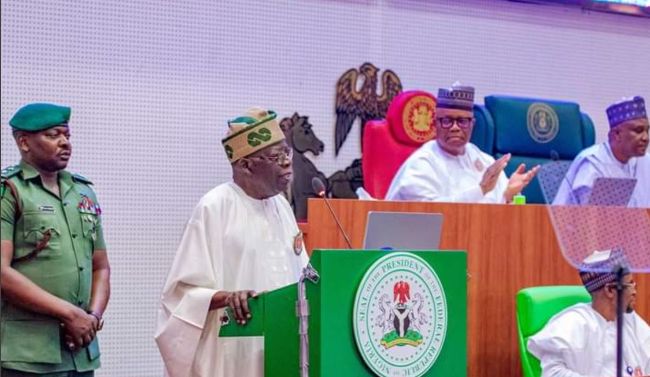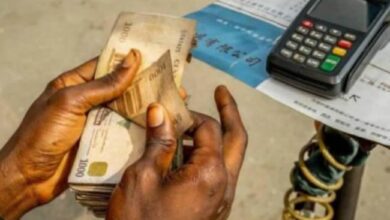2025 budget and Tinubu’s Renewed Hope Agenda
A financial expert, Prof. Uche Uwaleke, said that the budget reflected its title
 By Kadiri Abdulrahman
By Kadiri Abdulrahman
President Bola Tinubu presented the 2025 budget proposal titled “Budget of Restoration: Securing Peace, Rebuilding Prosperity” to the joint session of the National Assembly on Dec. 18, 2024.
While presenting the N49.7 trillion budget proposal, Tinubu said that it aligned with his administration’s Renewed Hope Agenda and underscores its commitment to stabilising the economy, fostering peace, and laying a foundation for sustainable prosperity.
He said that the budget proposal reinforced his administration’s roadmap to secure peace, prosperity, and hope for a greater future for the nation.
We’re committed to lift Africa out of poverty – Tinubu
“This budget strikes at the very core of our Renewed Hope Agenda and demonstrates our commitment to stabilising the economy, improving lives, and repositioning our country for greater performance,” Tinubu said.
Stakeholders are, however, divided about the practicability of the budget proposal.
A financial expert, Prof. Uche Uwaleke, said that the budget reflected its title, with the lion shares going to defence and security (N4.91 trillion), infrastructure (N4.06 trillion), education (N3.52 trillion) and health (N2.48 trillion).
Uwaleke, of the Institute of Capital Market Studies at the Nasarawa State University, Keffi, said the budget projected that inflation would moderate to 15 per cent in 2025, while the Naira would appreciate to N1,400 per U. S. dollar.
According to him, the projection is on the back of expected reduction in importation of petroleum products.
“This is alongside increased export of finished petroleum products, bumper harvests enabled by enhanced security, as well as increased foreign exchange inflows,” he said.
He, however, expressed concern that the 2025 budget may witness a high level of off-budget funds, thereby masking the true picture of government fiscal position.
He said that recurrent (non-debt) spending made provision of N846 billion for the new minimum wage related adjustments.
He said that it was doubtful if that amount would be sufficient to accommodate the attendant bailouts to sub-nationals by the Federal Government in support of the implementation of the new minimum wage.
“These potential off-budget funds are capable of undermining government’s plan to progressively reduce deficits and borrowings over the medium term.
“For the 2025 budget not to run into a major hitch, it is important that as much as possible, all claims on public financial resources are identified and reconciled within the framework of the budget,” he said.
The expert also raised concern about financing of the N13.4 trillion deficit, in which asset sale and privatisation proceeds would contribute N312 billion, while N3.8 trillion represents multilateral/bilateral project-tied loans.
He said that the bulk of the borrowings (N9.3 trillion) would be largely discretionary and non-project tied.
“In order not to compound the already huge debt burden the country is facing, every effort should be made to ensure that all long-term funds sourced from the debt capital market are tied to self-liquidating projects.
“The budget breakdown contained in the executive proposal is meant to provide the nuts and bolts that will facilitate budget implementation and control.
“Besides the concern which the financing of the deficit raises, there are equally other weighty issues that deserve careful scrutiny by the National Assembly.
“For example, a thorough review of the line items that make up service wide votes and capital supplementation can free-up significant funds that can be channelled to other critical areas such as agriculture and solid minerals,” he said.
He urged the National Assembly to interrogate the composition and rationale for the margin for increase in costs and recurrent adjustment (N12 billion) as well as the line item tagged “contingency recurrent” (N36 billion).
”Curiously, the same figures appeared under service wide votes in 2024. Equally, under capital supplementation is a line item known as “contingency capital” (N200 billion), which also featured in 2024 budget for same amount,” he said.
The Nigerian Economic Society (NES) said that the N47.9 trillion 2025 budget was the lowest the country has had since 2018 in dollar terms.
According to Adeola Adenikinju, President of NES, though the budget is at a record high in Naira terms, the effect of Naira devaluation has shrunk its value when converted to the U.S. dollars.
“In nominal terms, the 2025 budget is the biggest Naira value budget in Nigeria’s history. However, in terms of real purchasing power, this budget is the lowest since 2018,” he said.
Adenikinju said that the benchmark exchange rate of N1,400 though ambitious, is considered not fully grounded in the potential fiscal and monetary expectations in 2025 and deviates from major expert projections.
He said that using this benchmark may require alternative supply sources of high and more stable forex earnings for building high external reserve stocks.
An economist, Dr Chijioke Ekechukwu, said that the pegging of the budget on an exchange rate of N1,400 to dollar would dampen the optimism of Nigerians.
He said that the dollar exchange rate can get lower as the year progresses and the effect of some reforms begin to surface.
“Nigerians are still thinking that probably that rate can still come lower than N1,400, maybe N1,000.
“There is a problem with that projection because you are dampening our hope of a reduction in the exchange rate,” he said.
A policy analyst, Basil Abia, said that the projections of the 2025 budget proposal were unrealistic.
Abia said that it was only with a higher crude oil production above the current rate that the reduction of inflation to 15 per cent in 2025 could be possible.
“Now, if you say you want to do 15 per cent headline inflation rate on aggregate for 2025, you have to be able to show us that you are going to realistically drop down the core drivers, reduce their efficacy, and their frequency.
“Unfortunately, you cannot do 15 per cent headline inflation rate when you are producing less than two million barrels per day,” he said.
The Lagos Chamber of Commerce and Industry (LCCI) said that improved tax-to-Gross Domestic Product (GDP) ratio, would help to meet the ambitious N34.82 trillion revenue projection in the budget.
The LCCI Director-General, Dr Chinyere Almona, said that accelerating tax reforms, simplifying processes, and incorporating the informal sector were crucial.
She said that the country must leverage technology to expand the tax net, minimise leakages, and foster fiscal discipline.
“Fiscal discipline must complement these efforts to effectively manage the N15.81 trillion debt servicing allocation.
“Nigeria must prioritise high-impact, self-sustaining projects and explore alternative funding mechanisms, such as public-private partnerships, to keep debts within sustainable limits.
“Structural reforms are indispensable to reducing inflation to 15 per cent and stabilising the exchange rate at N1,400 to the dollar,” she said.
She said that addressing food and energy supply chain bottlenecks, fast-tracking local petroleum production projects, and fostering alignment between monetary and fiscal policies would restore confidence in the Naira and ease inflationary pressures.
“Achieving the ambitious oil production target of 2.06 million barrels daily requires decisive action to resolve pipeline vandalism, theft, and underinvestment.
“Across the three streams of operations in the oil and gas industry, a sound regulatory environment can boost activities and investments in the short term,”she said.
Almona lauded Tinubu’s attention to security, infrastructure, education, health, and agriculture to achieve macroeconomic stability and inclusive growth.
She said that the allocation of N4.91 trillion for defence was commendable compared to previous allocations.
She, however, said that the funding must be complemented with enhanced intelligence, surveillance technology, and simultaneous investment in poverty reduction and youth empowerment.
Almona said that the N4.06 trillion earmarked for infrastructure and significant allocations to education and health called for swift and transparent project execution.
According to her, while the budget outlines bold goals, these aspirations hinge on robust policy implementation, sustained execution, and coherence across government strategies.
“Beyond the figures and assumptions, budget implementation is the key performance driver.
“The 2024 budget implementation cycle extension to June 2025 should be closely watched to avoid such in the future as it can signal weak budget execution.
“We call on the National Assembly to expedite action on the appropriation debates,” she said.
As most Nigerians await the passage and operationalisation of the 2025 budget, they remain hopeful that it will effectively address rising inflation and moderate the prices of basic goods and services in the interest of the masses.
Stakeholders, however, said that a major snag to a thorough interrogation of the appropriation bill is its late presentation to the National Assembly.
They urged the lawmakers to properly scrutinise the contents of the appropriation bill before it is passed to ensure that it effectively address the yearnings of Nigerians.
News Agency of Nigeria (NAN)


 By Kadiri Abdulrahman
By Kadiri Abdulrahman









